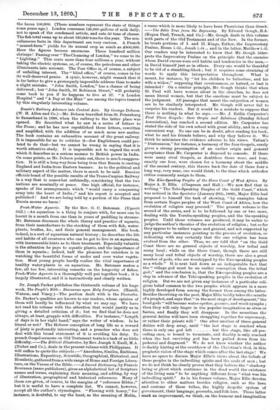Dr. Joseph Parker publishes the thirteenth volume of his huge
work, The People's Bible : Discourses upon Holy Scripture. (Hazell, Watson, and Viney.)—The portion dealt with is the Proverbs. Dr. Parker's qualities are known to our readers, whose opinion of them will hardly be influenced by what we may say. We have not read his volume with the attention that would justify us in giving a detailed criticism of it ; but we find that he does not always, at least, grapple with difficulties. For instance, " Length of days is in her right hand," says the writer of wisdom. Is he literal or not? The Hebrew conception of long life as a reward of Piety is profoundly interesting, and a preacher who does not deal with this broad statement of it is avoiding his duty. To preach Gospel sermons on Old Testament texts is a task of no little difficulty.—The Biblical Illustrator, by Rev. Joseph S. Ezell, M.A. (Nisbet and Co.), deals in the present volume with Philippians. It will suffice to quote the subjects —"Anecdotes, Similes, Emblems, Illustrations, Expository, Scientific, Geographical, Historical, and Homiletic, gathered from a wide range of Home and Foreign Litera- ture, on the Verses of the Bible.—d Sacred Dictionary, by Francis Bourazan (same publishers), gives an alphabetical list of Scripture names and terms, explaining their meaning, and adding, by way of illustration, geographical and historical references. Many of these are given, of course, in the margins of " reference Bibles ;" but it is useful to have a complete list. We cannot, however, accept all the author's etymologies. " Flowing with honey," for instance, is doubtful, to say the least, as the meaning of Malta, a name which is more likely to have been Phoenician than Greek. —The Bible True from the Beginning. By Edward Gough, B.A. (Began Paul, Trench, and Co.)—Mr. Gough deals in this volume with parts of the Old Testament and of the New. In the former, he treats portions of I. and II. Kings, Esther, the Imprecatory Psalms, Hosea i.-iii., Jonah i.-iv. ; and in the latter, Matthew is ii. Our readers may be interested to know that Mr. Gough inter- prets the Imprecatory Psalms on the principle that the enemies whom David curses were evil habits and tendencies in the man,— in David himself just as in others. Every one would be thankful to be rid of a stumbling-block ; but it requires some straining of words to apply this interpretation throughout. What is meant, for instance, by " let his children be fatherless, and his wife a widow," supposing that covetousness, or hatred, or lust is intended P On a similar principle, Mr. Gough thinks that when St. Paul will have women silent in the churches, he does not mean literal women, but that the emotions must be subject to the judgment. All passages that assert the subjection of women are to be similarly interpreted. Mr. Gough will never fail to surprise his readers. But it would be a mistake to suppose that there is nothing in what ho says.—Mr. J. Estlin Carpenter's First Three Gospels : their Origin and Relations (Sunday School Association), has reached a second edition. Mr. Carpenter has stated the side of his own school with great ability, and in a very convenient way. No one can be in doubt, after reading his book, what he and his friends believe, and why they believe it. We think he minimises the evidence adverse to his views. Tatian's " Diatesaaron," for instance, a harmony of the four Gospels, surely gives a strong presumption of an earlier origin and general acceptance than Mr. Carpenter is disposed to concede. If there were many rival Gospels, as doubtless there were, and four, exactly our four, were chosen for a harmony about the middle of the second century, this throws back the date of these four a long way, very near, one would think, to the time which orthodox critics commonly assign to them.










































 Previous page
Previous page